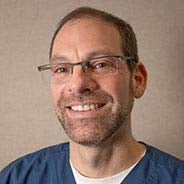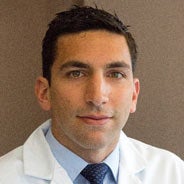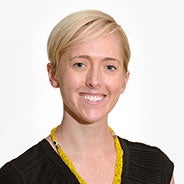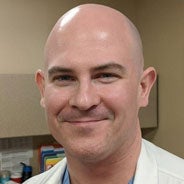
Medical Director
Ron Medzon, MD
Associate Professor in Emergency Medicine, Boston University School of Medicine
Dr. Medzon is an Emergency Physician at Boston Medical Center. He graduated from the Albert Einstein College of Medicine, and completed his Emergency Medicine Residency at Boston City Hospital.
Dr. Medzon started the Emergency Medicine Residency simulation program, and was a founding Co-Director of the Solomont Center for Clinical Simulation and Nursing Education, and currently is the Director. The Solomont Simulation Center serves the entire staff of Boston Medical Center, promoting the mission to educate learners to provide an ever-improving quality of care and patient safety throughout the hospital. Its focus is on Interprofessional communications leading to safer patient care.
Dr. Medzon has created partnerships with the medical community at large, including Boston University School of Medicine, Boston University School of Medicine Physician Assistant Program, and the Boston University Henry M. Goldman School of Dental Medicine. His clinical and research interests are in Trauma and Airway Management. He has taught in simulation courses regionally and nationally at the Society of Healthcare in Simulation Meeting. He has twice been awarded the Outstanding Faculty Award in Emergency Medicine at BMC.

Nursing Clinical Director
Pamela Corey, MSN, EdD, RN, CHSE
Pamela is a Nurse Professional Development Specialist and one of the Clinical Directors in the Solomont Simulation Center. She received her Associate Degree in Nursing from Laboure College, Boston, Bachelors in Science in Nursing from Graceland College in Iowa and Master's in Nursing Education from Walden University. Pamela obtained her Doctorate in Education from Walden University in 2016, specializing in Adult Learning and Simulation Education.
Pamela has worked at Boston Medical Center since her graduation in 1984. Her clinical focus has remained in pediatrics including the PICU and NICU. After moving into nursing education in 2008, and focusing in simulation, Pamela was part of the founding team of the Solomont Center for Simulation and Nursing Education. She obtained her Certification as a Healthcare Simulation Educator in 2012. Pamela has assisted in the development of the team training curriculum programs, debriefing workshops and promoting simulation in nursing education programs. Her doctoral dissertation compared the adult and pediatric code simulation programs.

Associate Clinical Director of Surgery
Brian Carmine, MD
Assistant Professor of Surgery, Boston University School of Medicine
Dr. Carmine is a general surgeon at Boston Medical Center and Boston Children's Hospital, specializing in the field of minimally invasive and laparoscopic surgery as well as surgery for weight loss. He is a graduate of The University of Virginia and received his medical degree from Eastern Virginia Medical School. He completed his residency and fellowship training at Boston Medical Center.
With a long-standing interest in resident education and as an advocate of the use of simulation for advanced skill development, Dr. Carmine was involved in the design of the original Solomont Center as well as the creation of the "surgical arcade", where minimally invasive fiber optic laparoscopic towers could be used to help hone surgical skills in trainees. In 2015, he assumed the position of Associate Director of Simulation at the center.
Dr. Carmine's educational interests include the early acquisition of complex psychomotor skills in surgical trainees as well as maintenance of these skills in veteran learners. Additionally, he is interested in the maintenance and improvement of interprofessional and multidisciplinary team communication to improve patient safety and the overall patient experience at Boston Medical Center and beyond. His clinical and community interests include weight loss surgery for adults and adolescents, robotic and laparoscopic surgery, abdominal wall reconstruction, and expanding awareness and availability of medical and surgical services to the traditionally underserved.

Associate Clinical Director of Anesthesia
Robert Canelli, MD
Dr. Canelli is an Anesthesiologist and Critical Care physician at Boston Medical Center. He was chief resident in anesthesiology at University of Massachusetts and completed a critical care fellowship at Beth Israel Deaconess Medical Center in Boston.
Dr. Canelli serves as the Site Officer for Anesthesiology within BMC’s Integrated Procedure Platform, where he works with the surgical and nursing leadership to improve operating room efficiency. His special interests include neuroanesthesia and point of care ultrasound. He is co-author of OK to Proceed? What Every Health Care Provider Should Know About Patient Safety which serves as the blueprint for BMC’s hospital-wide patient safety curriculum.
Dr. Canelli was named Clinical Director for Simulation for Anesthesiology at Boston Medical Center in 2015. Since then, he has developed a simulation-based Anesthesia curriculum for the residency program including a bi-annual Objective Structured Clinical Examination. In addition, he has worked with his surgical and nursing counterparts to develop interprofessional simulation programs including the Perioperative Team Training Simulation Curriculum and the Emergency Airway Response Team Training Simulation Curriculum. These programs have earned him the Teacher of the Year Award given by anesthesia residents to most outstanding faculty.

Associate Clinical Director of Obstetrics and Gynecology
Shannon Bell, MD
Dr. Bell is a generalist obstetrician-gynecologist at Boston Medical Center. She graduated from the University of California, San Francisco School of Medicine in 2011, and completed her Obstetrics and Gynecology residency at Boston Medical Center in 2015. She became board certified in Obstetrics and Gynecology in December 2016.
Dr. Bell joined the faculty of the Solomont Simulation Center as Associate Clinical Director in August 2015 when she entered practice. She started designing simulations as a Chief Resident for Education at Boston Medical Center, and now runs summer simulation workshops as well as monthly simulations for OB-GYN resident didactics. In addition, Dr. Bell has incorporated simulation into the culture of the Department of Obstetrics and Gynecology, instituting an interdisciplinary in situ simulation program which runs six hours of simulation per month on the labor and delivery unit at Boston Medical Center, involving obstetricians, family medicine, midwifery, nursing, anesthesia, and consulting services, as appropriate to the scenario.
In 2017, Dr. Bell was accepted as a new member of the American Congress of Obstetricians and Gynecologists Simulations Working Group, which "is dedicated to the development and implementation of unique, standardized, and validated simulations-based curricula as an adjunct to improve residency education and clinical competence beyond residency." Dr. Bell's interests include the role of simulation in quality improvement/patient safety projects and resident skill development, as well as the development of scenarios which not only support clinical and surgical excellence, but also help our clinicians acknowledge and attend to patients' social determinants of health as a major driver of health outcomes.

Associate Clinical Director of Emergency Medicine Simulation
Stephanie Stapleton, MD
Dr. Stephanie Stapleton is an Emergency Medicine Physician at Boston Medical Center. She graduated from Boston University School of Medicine and completed her Emergency Medicine Residency at University of Connecticut. She finished her Medical Simulation Fellowship Hartford Hospital under the direction of Drs. Thomas Nowicki and Alise Frallicciardi.
Dr. Stapleton has expanded the Emergency Medicine simulation program to advance trainee skill development and practice, decision making, teamwork, and multiple disciplinary patient care. She leads the EM resident sims which include monthly group multi-station sessions and independent sessions, PGY 1 & 2 orientations, and senior exit sessions. She also leads the medical student sim which occur once per block and the EM bound bootcamp.
Dr. Stapleton is Co-Chair of the SAEM Sim Academy research committee, a member of Society of Simulation in Healthcare and the International Network for Simulation-based Pediatric Innovation, Research, and Education. She has presented nationally at IMSH, SAEM, and CORD on simulation studies, innovations, interventions, and instruction.
Her areas of interest are latent safety threat mitigation, process improvements, novel model creation, innovations testing, and building an adult EM simulation based research community. Her current projects include multiple in situ simulations to evaluation for new technology use, patient care, and safety threat identification; multiple novel models for procedural learning and improving mentoring for adult EM sim research.

Associate Clinical Director of Internal Medicine
Thomas Ostrander, MD
Dr. Ostrander is an Internal Medicine physician at Boston Medical Center where he serves as the Director of General Internal Medicine Inpatient Services, Assistant Program Director of the residency program focusing on the preliminary intern program, and as Associate Director of the Solomont Simulation Center.
Dr. Ostrander first completed his Masters of Public Health at Tufts University in 2003 and returned to Tufts for medical school several years later, graduating in 2010. He completed his residency at Boston Medical Center in 2013 and stayed on as a hospitalist where he fostered his passion for clinician education, bedside procedures, and clinical excellence.
Dr. Ostrander's areas of interest in simulation are geared towards high quality and safe patient care, including bedside procedures, team training in various clinical scenarios, and code training. He also helps to facilitate numerous programs addressing communication skills among trainees, aimed at improving the quality of patient encounters and addressing patient satisfaction. Dr. Ostrander is an active participant in the emerging Point of Care Ultrasound program at BMC, focusing on inpatient training of Internal Medicine residents.
 en
en 
 Français
Français Deutsch
Deutsch Italiano
Italiano Español
Español Tiếng Việt
Tiếng Việt Kreyol ayisyen
Kreyol ayisyen